In this week’s review of Court Judgments, we look at Supreme Court’s observation that the responsibility to prove a case beyond doubt lies with the prosecution and its view regarding preference to advancing justice over technicalities. We also look at the Punjab & Haryana High Court’s observation regarding the forced termination of pregnancy against women’s will, the Delhi High Court’s order regarding Trademark infringement and the J&K&L high court’s order allowing medical reimbursement for treatment in hospital which is not part of the approved list.
Punjab and Haryana HC: Motherhood is Innate; Forcing Wife to Terminate Pregnancy Against Her Will Amounts to Cruelty
A Punjab & Haryana High Court bench comprising of Justice Ritu Bahri and Justice Nidhi Gupta observed that motherhood is innate and natural to every woman and forcing a wife to terminate her pregnancy against her will constitutes cruelty.
As per the case, Renuka vs Shelly Kumar, they both got married as per Hindu marriage rituals in August 2012. The wife started living with her husband and his family, where she alleged that there was continuous torture – physically, mentally, and emotionally by her husband and family, with a demand for more dowry.
She got pregnant in October 2012, but her husband got her pregnancy terminated forcibly, stating that he has no means to bring up the child. She was not allowed the required rest for recovery and was forced to work by her mother-in-law. This resulted in gynecological complications due to which she was not able to conceive again. There were further events that caused mental agony to her.
In 2015, she was turned out of her matrimonial home. Alleging that she was treated with cruelty and that her husband deserted her, she filed a petition for divorce under Section 13 of the Hindu Marriage Act, before the Family Court, Hisar. Her appeal was dismissed by the court.
This was challenged in the High Court. The High Court bench noted that the allegations that she could not conceive due to the gynecological complications developed after being forced to terminate the pregnancy were supported by medical records. It further noted that the husband’s denial of the allegations in the family court was lackadaisical.
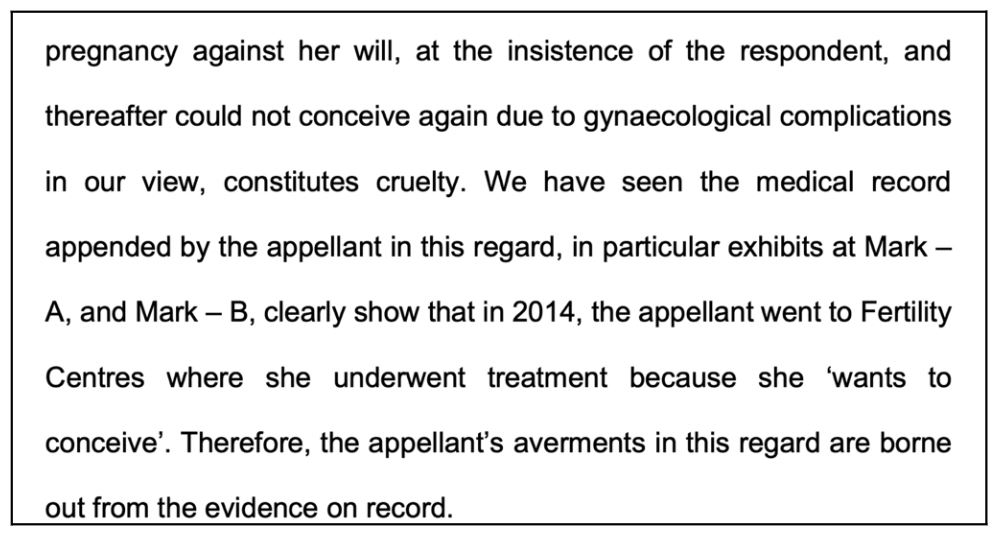
The court stressed that motherhood is innate, natural, and fulfilling to every woman and that forcing her to terminate her pregnancy against her will constitutes cruelty. It further noted that the conduct of both the parties shows that there are irreconcilable differences between the parties, and therefore, allowed the appeal of the wife and decreed the petition for divorce under Section 13 of the Hindu Marriage Act.
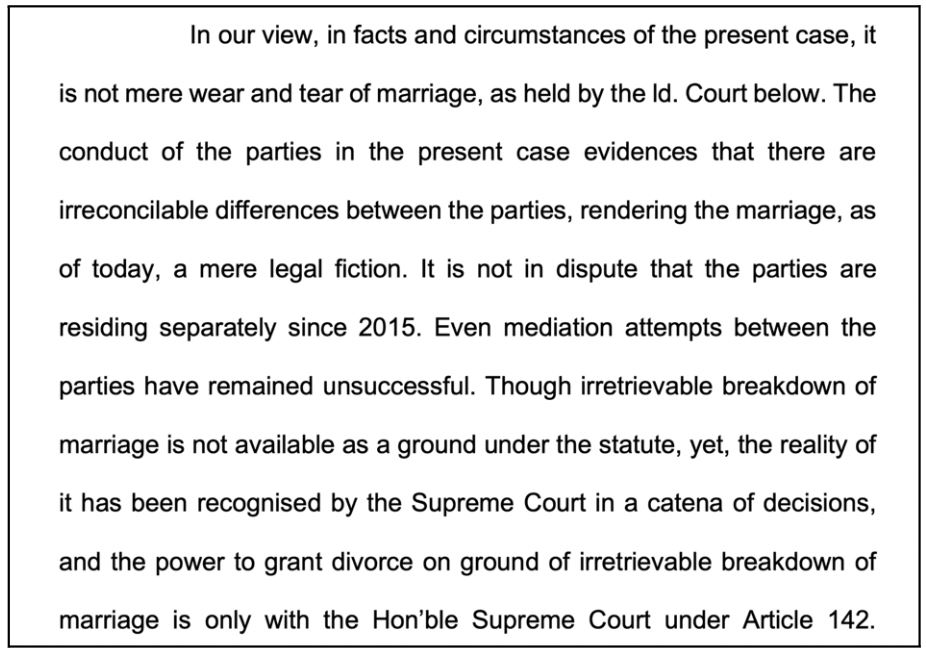
Delhi HC: Permanently Restrains Foreign Company from Using “TATA” Trademark in Cryptocurrency Trading.
Delhi High Court has restrained a UK-based company from unauthorised usage of the registered trademark ‘TATA’ while selling and marketing of digital tokens i.e., cryptocurrency.
An appeal was filed by Tata Sons Private Ltd, seeking a permanent injunction restraining infringement of their trademark ‘TATA’.
In September 2019, a division bench had set aside an order passed by the single judge declining interim relief to the TATA group. The judge doubted its extraterritorial jurisdiction to injunct the overseas parties, as the company against whom the infringement was filed was UK-based.
After the filing of the case, “Hakunamatata $Tata Founders” took down their websites ‘www.hakunamatata.finance’ and ‘www.tatabonus.com’ and changed their name to Hakunamatata Token Ltd. The website was changed to ‘www.hakunamatatatoken.com’. The name of the Crypto-token was changed to $HKUN Token.
However, a legal notice sent by Tata Sons, seeking an undertaking from the company that it will not use the ‘TATA’ mark was not responded. The court also stated that the defendant did not appeal before the court despite multiple summons and notices.
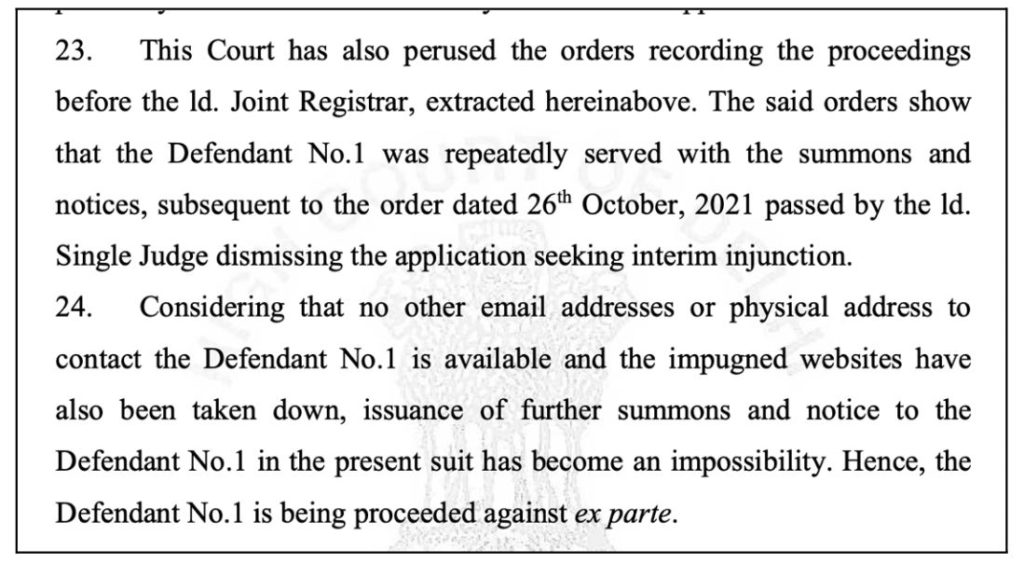
Delhi High Court ruled in favour of Tata Sons and permanently restrained the company from using the trademark, ‘TATA’.
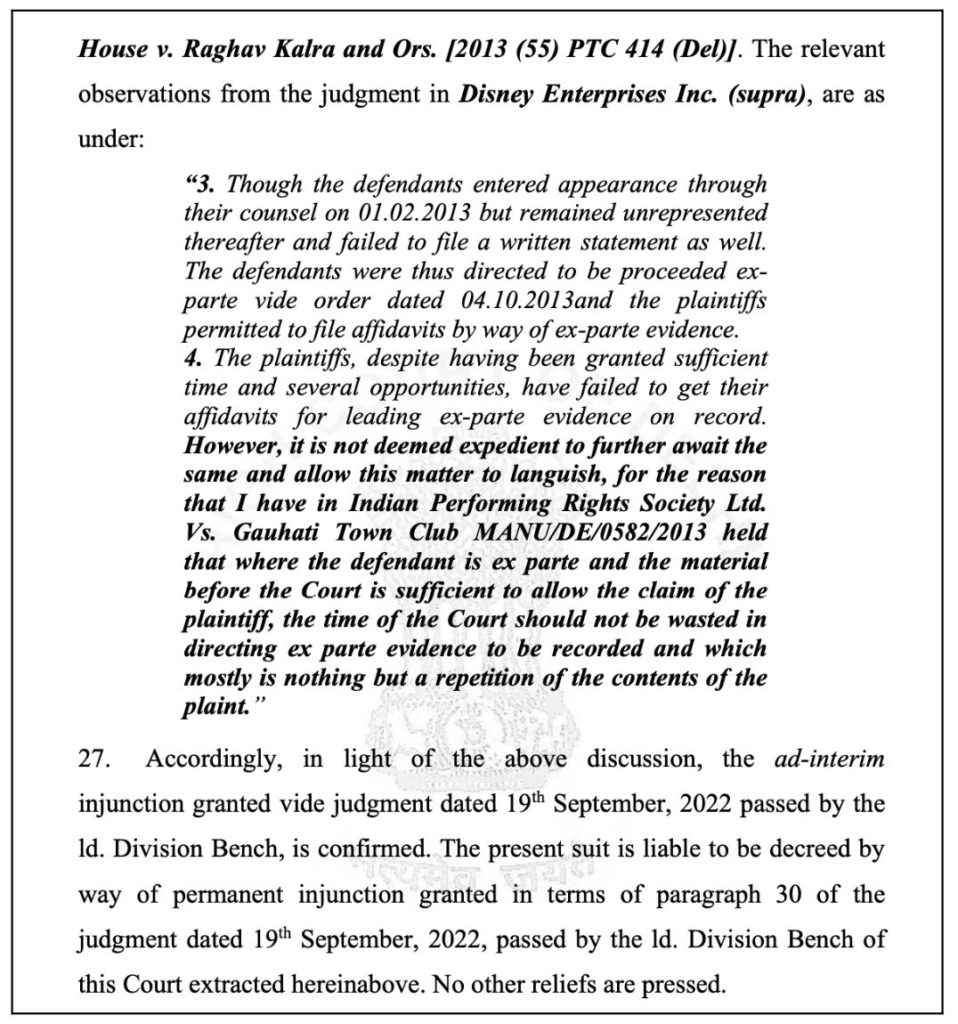
J&K&L HC: Medical Claim Cannot be Denied Solely for Having Undergone Emergency Treatment in a Hospital Not Prescribed by Government Order.
The Jammu and Kashmir and Ladakh High Court has ruled that an employee cannot be denied medical reimbursement for the sole reason that he has undergone treatment in a hospital that is not recognised or approved by the state or not included in the Government order.
The deceased in this case got seriously ill while performing his duties, and was shifted to Government Medical College Hospital, Jammu in 2009. He was shifted to Apollo Hospital, New Delhi in the emergency wing as his health continued to deteriorate. Based on the tests conducted, he was diagnosed to be suffering from Blood cancer. He was shifted to AIIMS (New Delhi) as the family did not have the means to continue the treatment in Apollo. The family felt that the response of the AIIMS doctors was not good and hence shifted back to Apollo for Chemotherapy.
As per the ‘BSNL Employee Medical Reimbursement Policy’, an employee and his/her dependants are entitled to reimbursement of expenses at the approved rates at all hospitals recognised from time to time by the management.
Justice Wasim Sadiq Nargal observed that this scheme also provides that in emergency cases, reimbursement would be allowed for treatment in non-recognised hospitals with the required approvals of the higher officials.
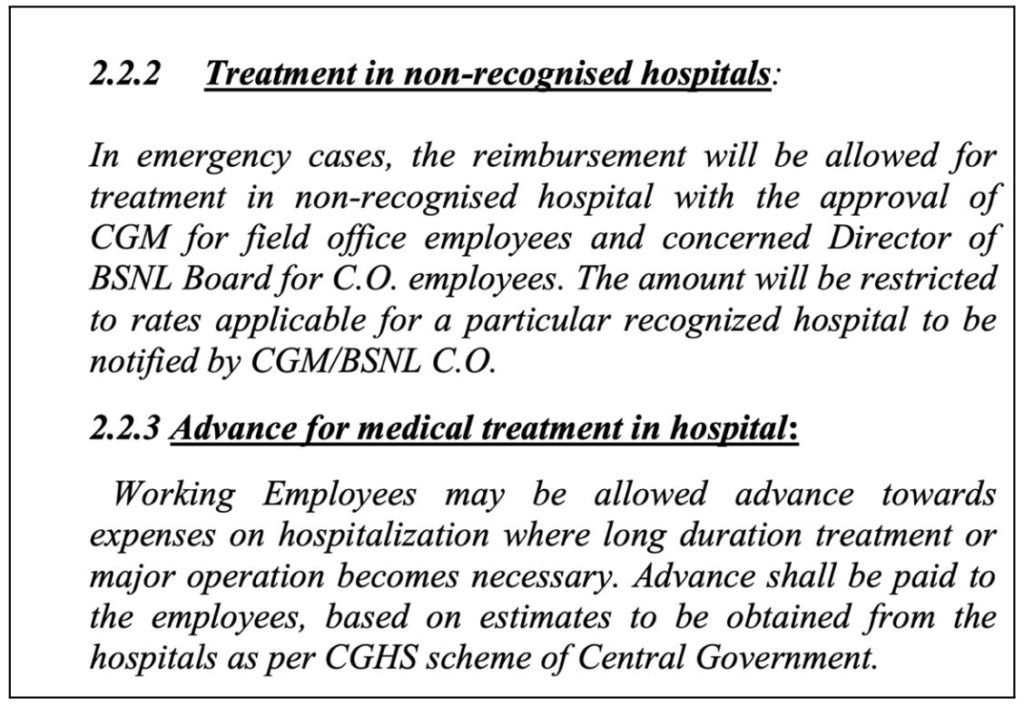
The court vouched for the liberal application of the scheme and that the technicality of the rules and regulations are not required to be followed just in a mechanical manner, which defeats the very purpose of the Scheme. It was of the opinion that each case needs to be examined on its own facts and that preserving health and medical aid aligns with the Right to Life as envisaged in Article 21 of the Constitution of India.
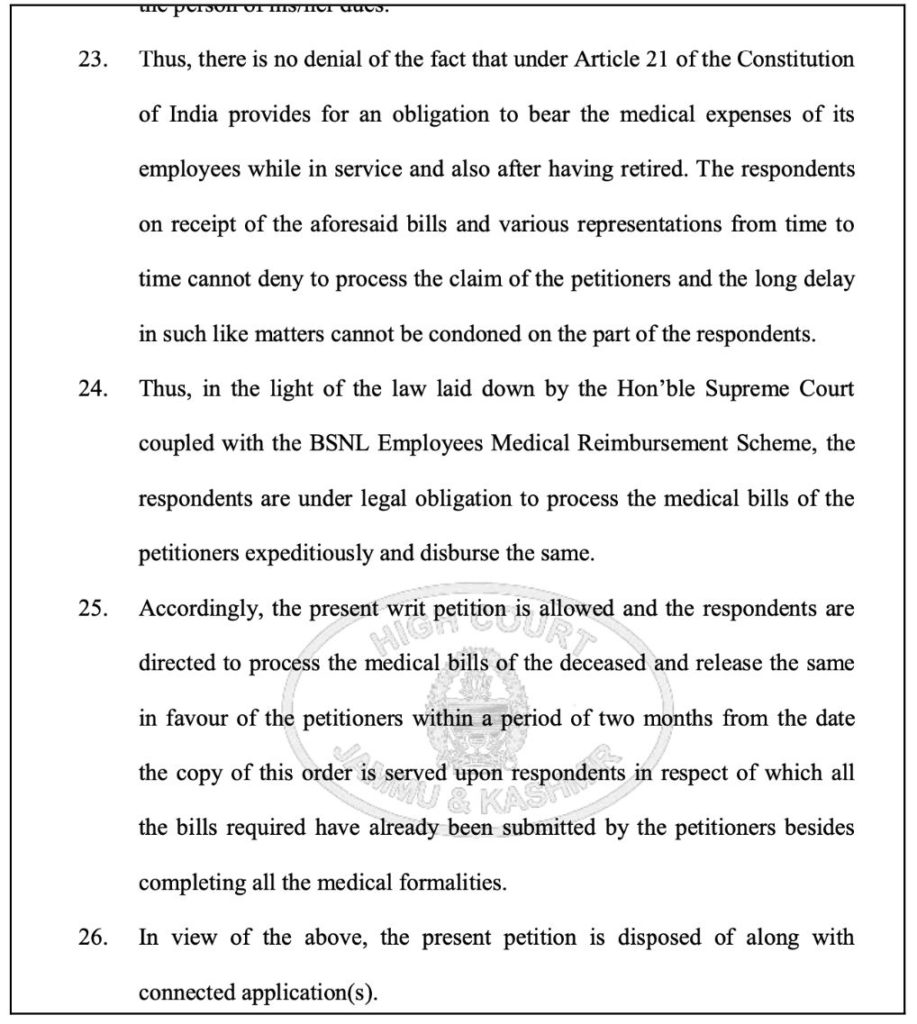
The court allowed the petition and directed the respondents i.e., to process the medical bills and release the amount in favour of the petitioners within a period of two months.
Supreme Court: When Two Views are Possible in Cases Related to Land Acquisition Compensation, Preference Should be for the One Which Advances Cause of Justice
In the case, Kazi Moinuddin Kazi Bashiroddin & Ors, vs. The Maharashtra Tourism Development Corporation, the Supreme Court was of the view that in matters dealing with payment of compensation to land losers, preference ought to be given to the view that advanced the cause of justice rather than a technical view.
In this case, a land loser is a person whose land has been acquired by the Government for public interest and who possesses a proper certificate. In the specific case, Maharashtra Tourism Development Corporation (MTDC) argued before the High Court that as per the directions issued in 2016, it has deposited 50% of the compensation awarded. However, it further proceeded to deposit a further amount of Rs. 1.37 crores by mistake and hence, it is entitled to withdraw the same.
The contention of MTDC was that, as per the terms of the High court order, 50% of the compensation was with security and the remaining 50% without security. Hence, it was not yet required to deposit 50% of the balance compensation and therefore needs to be allowed to withdraw the amount.
The High court accepted the submission made by MTDC and allowed them to withdraw the aforesaid amount. The appellant was aggrieved by this order and approached Supreme Court. The Supreme court stated that as per the facts of record, the High Court order regarding compensation explicitly states that 50% of the compensation was to be deposited without security and the balance after furnishing security.
However, there is no question about the total amount to be compensated. The submission by MTDC and the view by the High Court allowing MTDC to withdraw the additional amount deposited is a technical view. It was of the opinion that in matters of compensation, such technical view needs to be overlooked and the compensation to the extent of what is granted needs to be allowed.
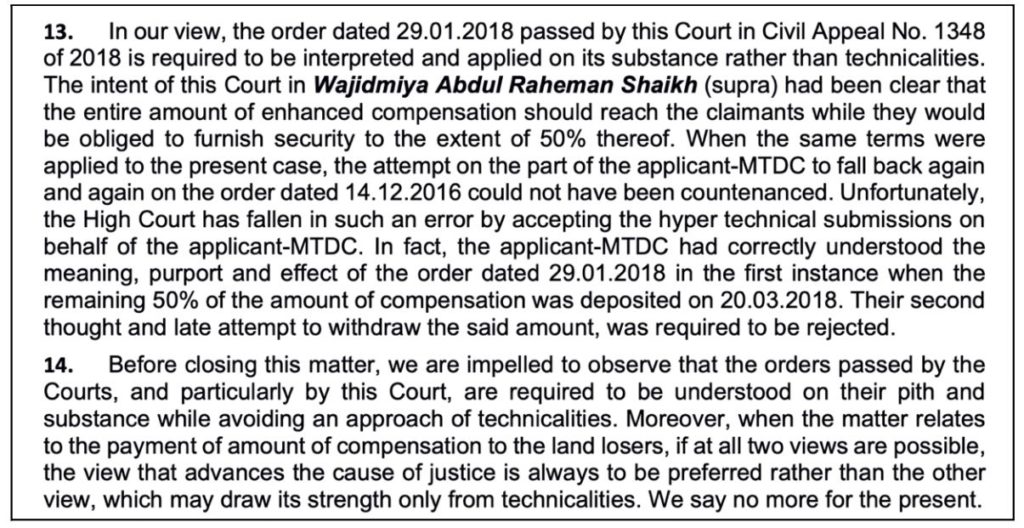
Supreme Court: In a Case of Circumstantial Evidence, Heavy Duty is Caused Upon the Prosecution to Prove a Case Beyond Reasonable Doubt.
The Supreme court bench comprising of Chief Justice UU Lalit, Justices S Ravindra Bhat and Sudhanshu Dhulia, was looking into an appeal filed by an accused person who was convicted in the murder of a 72-year-old man.
The accused were awarded a life sentence by the Trial Court, which was upheld by Karnataka High Court. An F.I.R, was lodged in October 2000, by the son-in-law of the deceased, stating that unknown persons murdered this father-in-law. As per the post-mortem report, he died because of a deep incised wound on the front neck. Based on a lead, the investigating officer caught the accused along with four other persons. The formal arrest of all five was made on 01 February 2001. A voluntary statement was given by one of them, which was followed by a confession by all five of the murder. Charges were framed under Section 302/396, read with Section 34 of IPC. They were convicted by the Trail Court and upheld by High Court.
4 of the 5 accused appealed before the Supreme Court. The question before the Supreme Court was whether the prosecution was able to prove the case beyond a reasonable doubt. The bench was of the opinion that the circumstantial evidence must be complete, and the chain of evidence must point towards the culpability of the accused.
It highlighted that this was missing for the prosecution’s case and that it was based on the confessional statement.
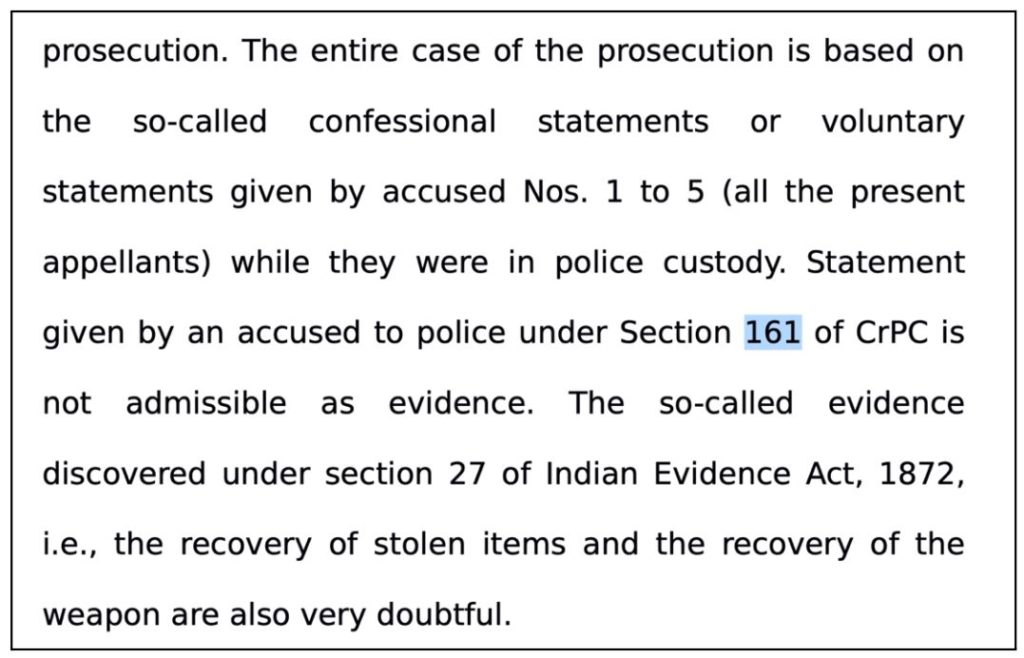
The bench was of the opinion that both Trial and the Appellate court were completely wrong in relying on the voluntary statements of the accused and their video-recorded statements.
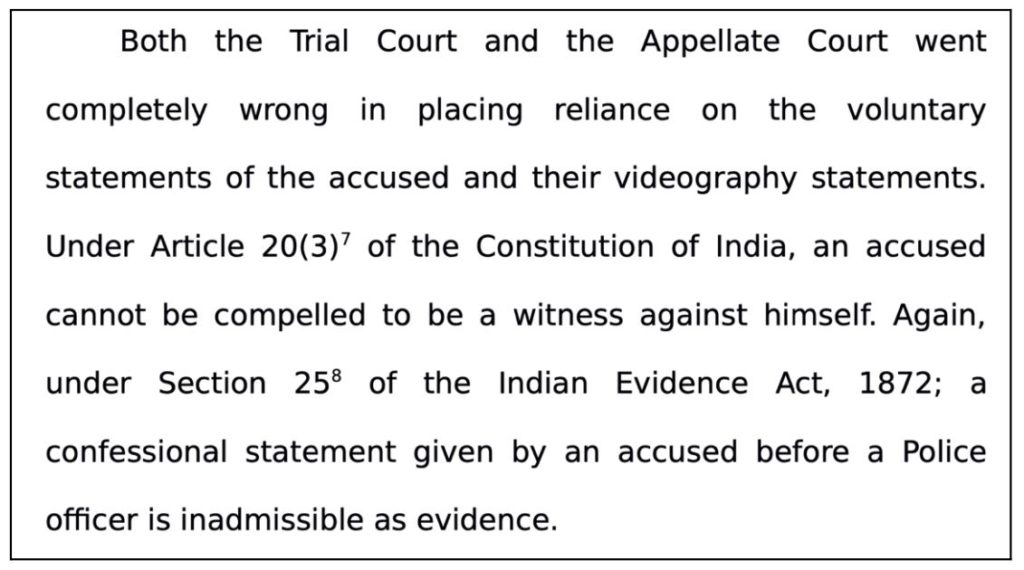
The Supreme Court bench also overlooked the allegations that they were involved in 20-25 such cases, of which no proof was provided. The Supreme Court stated that both the Trial court and the High court ignored the well-established principles of criminal jurisprudence and have relied upon facts and evidence which are clearly inadmissible in a court of law.
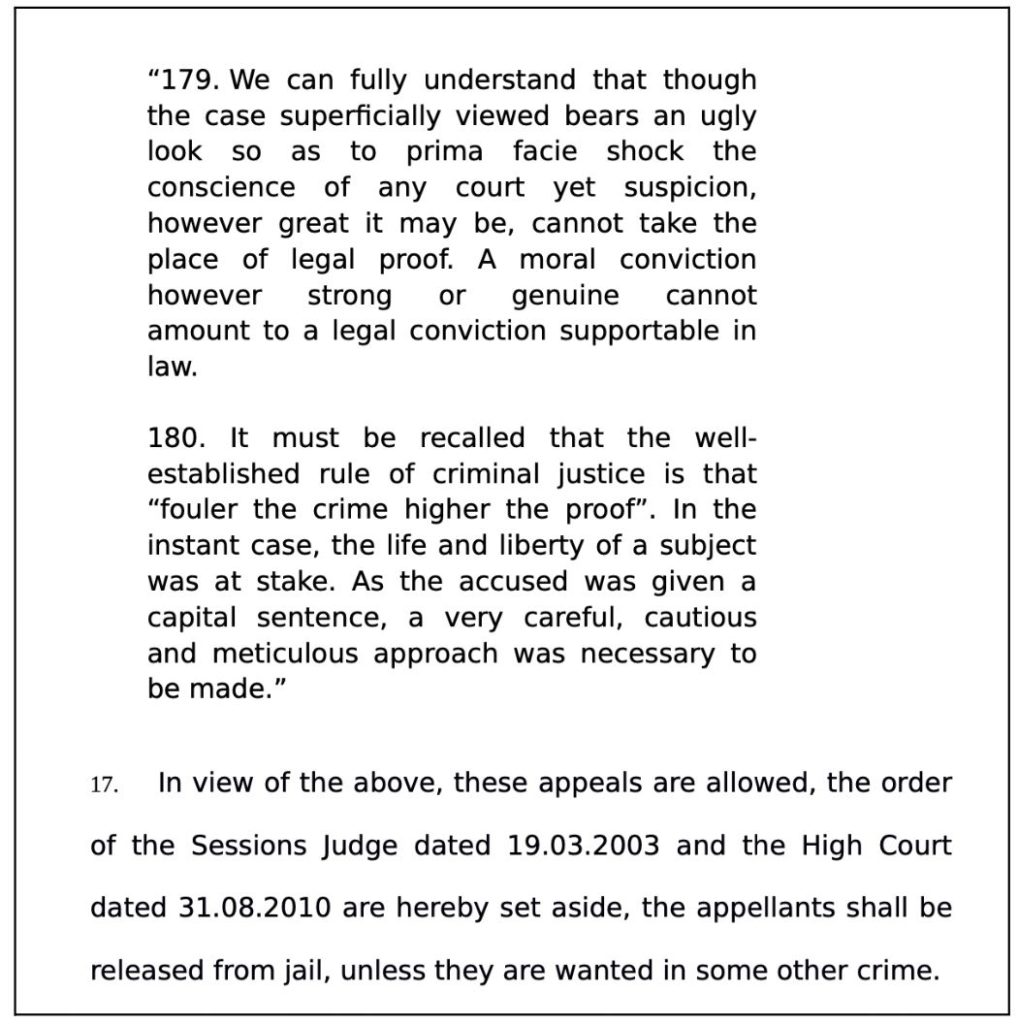
Featured Image: Review of Court Judgments


